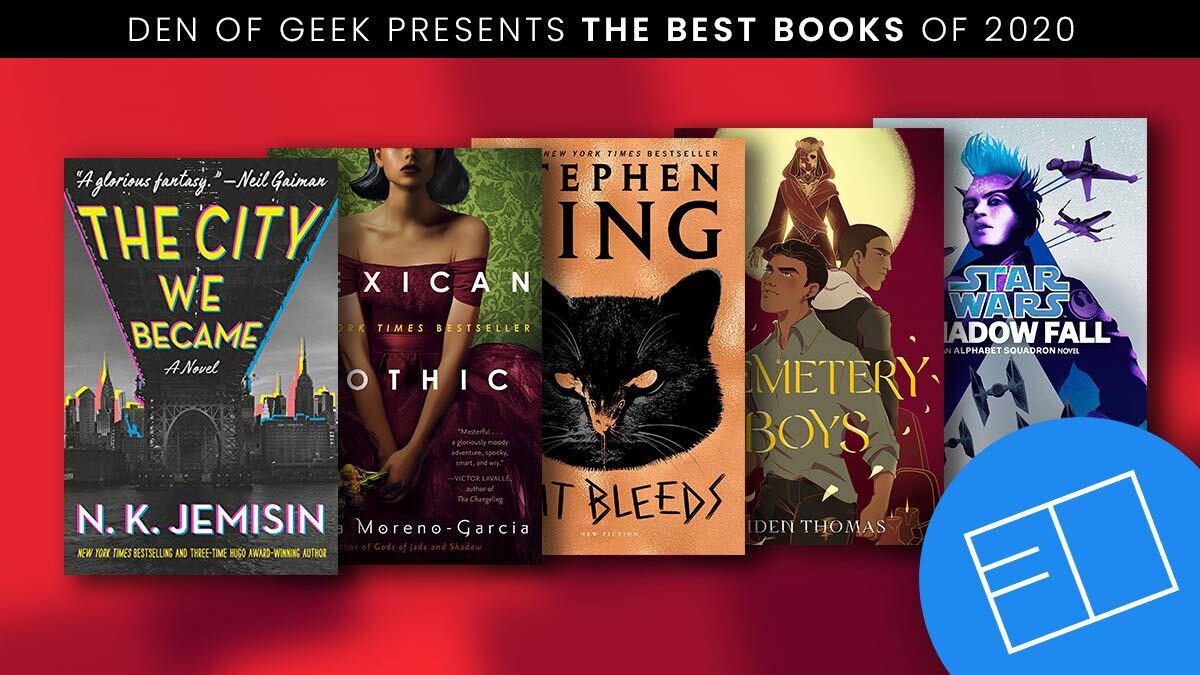In 2020, we needed good stories more than ever: To escape, even for a little while. To subvert and question the status quo. And to remind us of the joys of being human. The books listed below fall into one, some, or all of the above categories. We had our contributors select the stories that meant the most to them this year and polled you the reader to compile a subjective yet comprehensive list of some of the year’s best. Here are the books, organized by genre, that broke through the cacophony to mean something to our Den of Geek contributors—and to you—this year…
Quick note before we begin: Like many other areas of the media industry and economy, the independent bookstore industry was hit hard by the lockdown caused by the pandemic, as more people than ever flocked to Amazon to get their reading fix. If you are inspired to purchase any of the titles we gush about below, consider using Bookshop.org or other sites that support independent bookstores (especially Black-owned ones) to do so. They need your help more than ever!
Best Horror Books of 2020
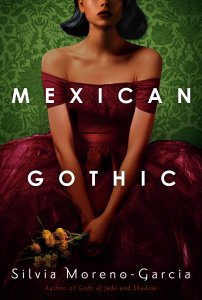
Mexican Gothic by Silvia Moreno-Garcia
Silvia Moreno-Garcia’s Mexican Gothic was the buzziest release of the summer – and with good reason. Her lush prose, descriptive settings and disturbing plot combine for one of the most compelling – and likely uncomfortable – reads you’ll experience this year. (If you love mushrooms, I’m really sorry in advance.)
Set in 1950s Mexico, the novel follows the story of the vibrant debutante Noemi, who must journey to a remote mountain village to check up on an ailing cousin, whose mysterious husband keeps insisting she’s mad. If you’ve ever read any Gothic literature before, you know many of the beats that come next: The isolated manor, the creepy servants, the dark dreams, the gaslighting, and the constant sense of rising dread. There’s even a cruel housekeeper that could give Mrs. Danvers more than a run for her money.
Moreno-Garcia uses nearly every conceivable Gothic trope to her advantage, telling a familiar tale whose often predictable elements still somehow manage to feel fresh and new. This is largely due to the deft way that the author weaves the political and the fantastical together, reckoning with larger issues such as racism, British colonization and Mexico’s fraught history with eugenics. A good story, well told, with more going on beneath the surface than one might expect.
– Lacy Baugher
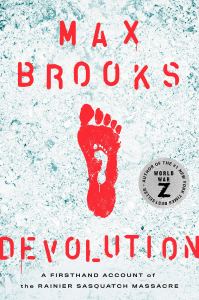
Devolution by Max Brooks
World War Z author Max Brooks takes on Bigfoot in this excellent eco horror which comes with added resonance during a pandemic. Like in his zombie bestseller, Brooks approaches the story as if it were real—it’s the novel equivalent of a found footage tale with the events that befall the residents of isolated eco community Greenloop documented in the diary of our protagonist Kate. Greenloop is a remote idyll of smart homes powered by sunlight and waste and controlled by phones and tablets where deliveries arrive via drone, but when the eruption of active volcano Mt Rainier cuts them off from the rest of the country the groups survival skills are tested. The trouble is, most members of this wealthy community don’t have any. And that’s before the family of sasquatches turn up…
This is a violent, vibrant horror with carefully drawn characters and an escalating sense of dread. Though there is humour here Brooks manages to make the Bigfoot group scary rather than faintly ridiculous, while the mirroring of the devolving eco society and the rise in power and confidence of their feral counterparts is handled skillfully. Intercut with interviews and real life stories of broken boundaries between man and wildlife it’s a cautionary tale that tells us never to underestimate nature, be wary of an over reliance on technology and that humans have animal instincts too.
– Rosie Fletcher
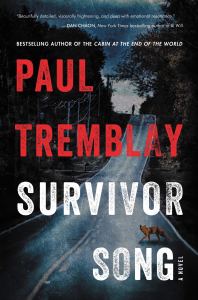
Survivor Song by Paul Tremblay
Tremblay completed his infection horror Survivor Song long before the pandemic hit but the novel is unsettlingly prescient. An outbreak of a deadly and fast acting strain of rabies has swept the country. Citizens are told to isolate at home while hospital staff are vastly overstretched and are put at risk due to a shortage of proper PPE. But when Doctor Ramola hears that her very pregnant best friend Natalie has been bitten by an infected human she’ll do anything in her power to help deliver the baby safely.
This is an incredibly poignant road trip novel, of sorts, which takes place over just a few hours. It’s a love letter to friendship, an anti-fairytale and a careful character study drenched in Tremblay’s characteristic ‘sad horror’. One ‘interlude’ section, which features characters from Tremblay’s earlier work A Disappearance at Devil’s Rock, is so utterly devastating you’ll want a biscuit and an episode of Schitt’s Creek just to get over it. If Tremblay’s A Headful of Ghosts was his take on the possession subgenre, Survivor Song would fall loosely into the zombie category, though it’s likely to be the most gorgeous and literary zombie novel you’ll read all year.
– Rosie Fletcher
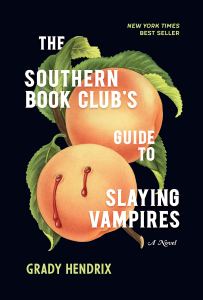
Southern Book Clubs Guide to Slaying Vampires by Grady Hendrix
Despite the slightly twee title, Hendrix’ latest is an evocative and often very frightening tale of a small town terrorized by a violent outsider. Based in the same world as his coming of age masterpiece My Best Friends’ Exorcism this tale is set in the 90s and focuses on the mothers of the small Southern town of Charlston: bored housewives whose work is often denigrated and overlooked.
At the centre is Patricia, who spends her time looking after a senile mother-in-law, almost grown kids and an ungrateful husband. She, along with neighbourhood friends, forms a book group who discuss true crime stories which provide handy knowledge and insight when Patricia begins to suspect handsome stranger James Harris is up to no good. Charleston is where Hendrix grew up so he paints the town vividly and with affection while acknowledging the oppressiveness felt by the women there, and the systematic racism experienced by the black community, whose children are disappearing and who are not being taken seriously.
Across his work from Horrorstor, My Best Friend’s Exorcism to We Sold Our Souls, Hendrix has proven excellent at writing women and girls. It’s no different here, where the Southern mums of Charleston are heroic and fearsome and their friendship is all powerful – if anyone can take on a vampire it’s them.
– Rosie Fletcher
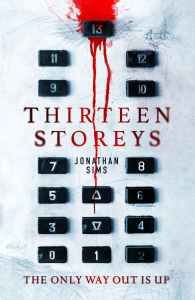
Thirteen Storeys by Jonathan Sims
This extraordinary debut by Sims is a both a multi-genre anthology and an overarching haunted house story. Centred around the mysterious Banyan Court, a housing complex consisting of a thirteen storey luxury high rise and the poorly built and utterly decrepit affordable housing unit hidden behind it, the book introduces us to various residents or people connected to Banyan Court, each of whom receives a mysterious invite to a dinner party on the top floor hosted by the strange and reclusive billionaire who owns the complex. At the end of this party, we are told, the billionaire will plummet 13 storeys to his death, and none of the guests will have any recollection of what happened.
This is a very smart first book, showcasing Sims’ talent in a range of different horror styles and bringing multiple voices without ever feeling overcrowded. There’s the eerie tale of a little girl and her imaginary friend, who might not be as imaginary as you think, the loyal door man and his violent alter ego competing for supremacy and the art dealer who becomes obsessed with a strange painting. Characters interweave in pleasing ways building to a grotesque but satisfying denouement which ties all the stories together. Sims is an exciting new voice in horror who is definitely one to watch.
– Rosie Fletcher

If It Bleeds by Stephen King – READERS’ CHOICE
The people have spoken!
Stephen King is not only one of the greatest writers of his generation but also one of the most prolific, and nigh a year goes by in which at least one of his stories—either new or adapted—isn’t in the cultural conversation. This year, it was If It Bleeds, a well-rounded horror collection of four previously unpublished stories, including one that features King universe character The Outsider‘s Holly Gibney (in the story that gives the book its name). The novellas revisit many of King’s most popular themes, from supernatural cell phones to the cost of creativity, and manage to feel both modern and nostalgic at the same time. If It Bleeds hit bookshelves in April and, in the midst of the real-life horror that was the pandemic, the continued killings of Black Americans by police officers, and the American presidential election cycle, King gave us something gloriously fictional to be afraid of. Whether you’re a longtime King fan or have never read anything by the horror master, If It Bleeds is well worth your time.
– Kayti Burt
Best Science Fiction Books of 2020
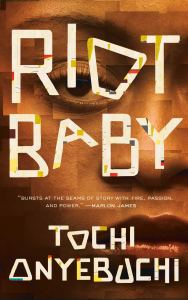
Riot Baby – Tochi Onyebuchi
One of 2020’s most incisive works packed more power into a novella than a book thrice its size; and while its particular story has a dystopian feel, it is actually keenly of the moment: not just the current protests against incarceration and police brutality, but the vicious and violent cycles that imprison, murder, or otherwise cut short Black lives. In an NPR interview at the start of the year when Riot Baby was published, Onyebuchi discussed how well-meaning white people talk about broken systems, when instead Riot Baby concerns “a system working just as designed.” That is, a system that cannot be overturned except possibly by superpowered means—and even then, not always easily.
Ella has a Thing, an otherworldliness to her that allows her to glimpse the fates, positive and negative, of those around her; to astrally project across the country and into others’ minds; to control unimaginable forces. But she can’t break her brother Kev (the “riot baby” of the title, born during the 1992 Los Angeles riots) out of Rikers Island. She can’t stop him from getting arrested in the first place, struggling as an adolescent not to transmute her rage into her powers and hurt those she loves, even as her baby brother is targeted for the color of his skin.
That tension and futility drive this slim account of not just their lives, but of the Black experience, projecting back to the roots of their family tree and forward to the authoritarian near-future in which Kev struggles to build the foundation of the rest of his life. Riot Baby is brutal, but it still nurtures hope—and it’s a necessary read for well-meaning white people like me.
– Natalie Zutter
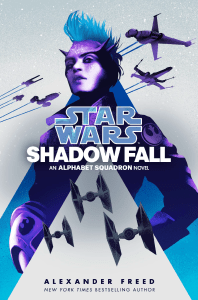
Star Wars: Shadow Fall – Alexander Freed
This might seem like an odd pick, as it’s the second in a tie-in trilogy, and not particularly accessible if you haven’t read the previous book. But I’m true to myself. This was certainly one of my favorite books of 2020, with the caveat that sometimes favorite means “heavy enough that it, artfully, made me extremely miserable.”
It’s not what you might expect from the generic title. I’m often fascinated by genre writers who try to tackle writing about aimlessness in genre, whether that be slacker heroes or the existential ennui faced by Alphabet Squadron between spaceship gun fights. It’s such a plot-heavy genre that writing about questlessness sounds very hard. And Shadow Fall has done that magic trick. To quote my own tweet, this book is about people who act on mistaken assumptions and concoct entire non-existent relationships in their heads and hurt themselves in fugue states. All of the relationships are intense, but splintered and sideways all the time. Each character is their own carefully defined brand of amoral and brittle. I’ve rarely seen awkwardness portrayed so well in a book without the story itself coming off as edgy and misanthropic.
It’s also a good adventure story, with set-piece battles, a mysterious cult, and a genuinely surprising take on how the Force works from a series that isn’t at all about Jedi. Start with the first book, Alphabet Squadron, don’t mind that title either, and make sure you have some calming tea ready.
– Megan Crouse

Sex Criminals Vol. 6: Six Criminals by Matt Fraction + Chip Zdarsky
Really, this is celebrating the end of Image Comics’ raunchy-yet-surprisingly-heartfelt series about Suze and Jon, who find out they share the same gift: Their orgasms stop time. So, of course, they start robbing banks—only to discover that it’s not just them with this gift, winding up on the lam from the Sex Police. But rather than treat this audacious premise like a fleeting dirty joke, Fraction and Zdarsky built out a deceptively simple metaphor into a thought-provoking exploration of lust-versus-love, money and class, the chasm between finding someone who “gets” you in the bedroom but not outside of it. With cheek and heart, they boiled all this down to Suze’s refrain of “This fucking guy” that makes me tear up every time I read it.
And it wasn’t all just bodily fluids and dangly bits—Sex Criminals also consistently delighted in pushing its own envelope in all things meta. Drawing in post-it notes to obscure the Queen lyrics they couldn’t get the rights to for a scene they’d already drawn; a sequence in which huge dialogue bubbles physically knock extras out of the way; even turning Fraction’s anxiety attack about writing a key scene between two female characters into its own mini-comic—this team often turned their probing gaze on themselves.
In the Sex Criminals universe, robbing banks was small potatoes, foreplay even—the final volume ascends beyond the initial crime, transforming into a treatise on grief and time and retreating into memory. As the final issue posits, take any significant moment between two people and you have to expand the frame, to look at every single other person who brought these two together, whether for a one-night stand or “to have and to hold.”
In fittingly 2020 fashion, the series concludes bittersweetly, but the final moments come back full circle to where the series started: wanting to prolong that particular pocket of time and space in which it’s just you and your person, the rest of the world be damned.
Yet Sex Criminals’ greatest legacy is that it’s not the last comic to delve into the intersections of sexuality and science fiction. Vault Comics’ Money Shot, from Sarah Beattie and Tim Seeley, is a clear successor with its story of underfunded scientists having sex with alien species in order to subsidize their interstellar teleportation research. As another series about copulating to undermine capitalism, Money Shot carries on the horny torch that Fraction and Zdarsky lit way back in 2013.
– Natalie Zutter
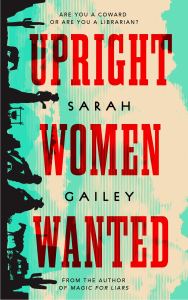
Upright Women Wanted by Sarah Gailey
Queer western speculative fiction. Need we say more? Sarah Gailey, author of Magic for Liars, is back with an all-too-brief tale of Librarians, the only truly free women in this version of the American west, and Esther, a stowaway escaping her small town and plenty of secrets. Nothing is as it seems, including those running the book wagon – one’s a trans guy with they/them pronouns who must masquerade as a woman for his own safety whenever authorities or other prying eyes are near.
While the noir of Magic for Liars made that world feel inevitably dark, Upright has a more hopeful outlook and a wide-open setting that feels full of possibilities, even as the Librarians make their way delivering books in the kind of dystopian setting you might find in The Handmaid’s Tale or The Grace Year. In a year so full of doom, the Librarians are capable and even swashbuckling in their adventures, teaching our newcomer narrator and maybe even making her swoon with their swagger.
– Delia Harrington
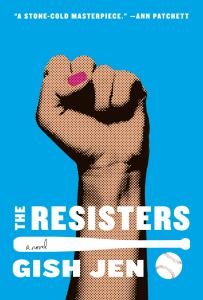
The Resisters by Gish Jen
In AutoAmerica, a not-so-distant future where everything is connected to artificial intelligence and the have-nots are meant to be good consumers and nothing more, a young Black-Asian woman with a gift for pitching baseball becomes the eye of the storm when her country decides to bring back the national pastime and compete in the Olympics.
Come for the underground baseball league, stay for the sly pop culture references. The world is built out so fully that the inevitable movie or limited series version of The Resisters might even be better than the book – blasphemy, I know, but so many concepts and kinds of tech are dropped in that a showrunner and crew would have a field day bringing to life.
It’s rare these days for a man to narrate spec fiction, and he certainly has the least interesting story here, but perhaps he has the best vantage point to admire his talented wife and daughter, the former a lawyer who repeatedly takes on Aunt Nettie, a defiant nickname for the government-backed AI who runs their lives, and the latter, a young woman who was raised in a defiant household, whom he hopes won’t fall for the allure of Aunt Nettie’s promises.
– Delia Harrington
Best Fantasy Books of 2020
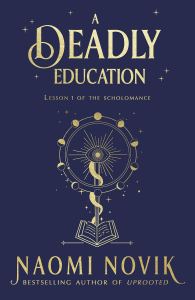
A Deadly Education by Naomi Novik
In a year where we are all struggling with how we feel about Harry Potter and its complicated legacy, Naomi Novik’s A Deadly Education has arrived to offer us an entirely different and thoroughly exciting magical boarding school tale. The first in a trilogy dubbed “The Scholomance” after the magical school at which it takes place, the story is sort of like Harry Potter’s dark twin, featuring a difficult female heroine, a unique magical system, and a very dark take on the world of teen magicians. (Plus, it features the sort of effortless, matter-of-fact diversity that more authors – both YA and adult – should emulate.)
Galadriel “El” Higgins is a powerful, potential dark sorceress in her junior year at the Scholomance. Here, students must fight for their lives from the moment of their admission against the horrifying monsters known as malificaria that roam the school halls trying to eat them on their way to class and graduation is simply a test of who can escape a roomful of the largest and deadly creatures in the school. El is powerful enough that she could probably wipe out all of them on her own, but she refuses to embrace her natural affinity for dark, potentially world-destroying spells – no matter how many of her fellow students think she already has.
Novik’s prose is as propulsive and fun to read as ever (consider this an additional, belated plug for her icy fantasy Spinning Silver) and A Deadly Education manages to put a fresh spin on what otherwise might feel like a staid, overdone setting. From its prickly heroine to the very real stakes that surround her classmates – most literally won’t live through final exercises – there’s so much here that feels unexpected and new. The sequel cannot come fast enough.
– Lacy Baugher
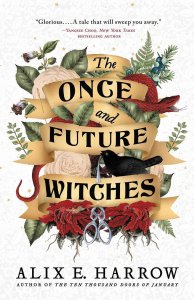
The Once and Future Witches by Alix E. Harrow
It’s rare that a story truly feels like magic, but such is the case with Alix E. Harrow’s lush and enchanting The Once and Future Witches. Part period piece, part celebration of sisterhood, and part feminist manifesto, the story is a love letter to women of all kinds, everywhere.
Set in an alternate version of America in the late nineteenth century when witching of all kinds is banned, this is a story about three sisters finding their voices and staking a claim to their own futures. It is also about accidentally summoning a magical tower and returning witchcraft to the world, healing the rifts between sisters and exposing the cracks between people who claim to want justice, but who actively work to oppress others. And it is about the power of community – the great things that can happen when women honestly see one another, support one another, acknowledge the challenges inherent in saying yes to help, and work together to make the world a better place. Isolation is dangerous, both for ourselves and the world we inhabit, and this is a novel that will make you want to call your personal coven and thank them for being there when you needed them.
Once upon a time, there were three sisters and they starred in a remarkable book, full of fairytales and folklore and old stories made new. In 2020, perhaps more so than ever, the idea of once and future resonates more strongly than it ever has before, the people we were and are, and what we might become – but only if we hold on to each other along the way.
– Lacy Baugher
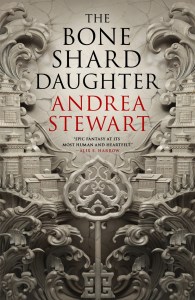
The Bone Shard Daughter by Andrea Stewart
Multi-perspective fantasy novels are all the rage right now, but Andrea Stewart’s The Bone Shard Daughter is truly something special. Not only does it deftly weave what initially seems like five separate stories together into something powerful and thrilling, the novel contains precisely the sort of compelling characters and rich worldbuilding that make this genre so much fun to read in the first place.
The first installment in the “Drowning Empire” trilogy, The Bone Shard Daughter is set in a sixteenth-century kingdom comprised of migrating islands that float through something called the Endless Sea. A story of empire and identity as much as it is a story of magic, the book at first follows Lin, the heir to the throne of Phoenix Empire, or, she will be as soon as she has proven she can properly use bone shard magic.
It’s this central magical system that makes this book so compelling – it involves commands being etched on pieces of human bones harvested from the general public in annual trepanning ceremonies, which are then used to power “constructs,” chimaera-like beings cobbled together out of various animal parts. If that wasn’t creepy enough, these shards literally drain the life energy from their doners to keep the constructs alive, a sort of human battery system that is horrifying to witness. (Especially when it appears that many of the more complex constructs have something like sentience of their own.)
Creepy and thoughtful, The Bone Shard Daughter grabs your attention from its opening lines, dumping you in a complex tale with lots of moving pieces that only gets messier as it goes on, and expects readers to keep up. For those who can manage it, it’s more than worth the journey. (And did I mention there’s a magical aquatic cat?)
– Lacy Baugher
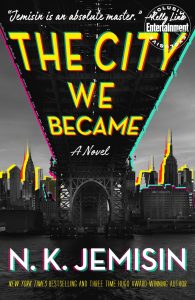
The City We Became – N.K. Jemisin
Jemisin is a master of fantasy world-building, and she turns that eye to the real world in an unsubtle, masterful New York City under attack by lovecraftian horrors. Funny, weird plot twists abound. This book starts with someone screaming on top of a roof, beautiful mystical singing from his point of view, and a neighbor yelling at him to shut up. There’s a musical beat through the whole thing, and all the ways that music can be added to or enhanced by the city noises all around it.
Along with living in the city herself, Jemisin meticulously researched its history and quirks. She’s great at digging into detail, but also knows when to go broad, adding pop culture and references that seem obvious in hindsight but not too goofy to maintain the tone of the story. It’s fast-paced, especially toward the end.
This is distinctly a novel for today, talking about racial tension from a variety of perspectives, and addressing the kind of harassment that comes with those conversations. It’s a snapshot for what’s been talked about on Twitter, what’s being talked about in art galleries and publishing houses. And it’s a snapshot of the city — kind and cruel, raucous and serene. It probably helps that part of this book made me feel some rare home state pride.
– Megan Crouse

The Unspoken Name by A.K. Larkwood
The Unspoken Name by K.A. Larkwood sets itself apart in two major ways: its setting and its characters. Priestess Csorwe is fated to be sacrificed to the eldritch god her people worship. But when she’s rescued from that fate with a wizard with ambitions of taking over a kingdom, she becomes a servant to a different master entirely — and has the chance to become far more than a sword-wielding minion. (There’s some cool sword-wielding too.)
Surrounding her are people motivated by power, ambition, the unknown, the experience of living always in the shadow of the unknown and their sense of what is known becoming askew because of it. It’s about emotional abuse and people who want things and people they shouldn’t and can’t have. At the core is Csorwe, refreshingly straightforward but wonderfully complex in her own way.
This story plays out in a world the author describes as an “eerie hyperspace labyrinth” that also does great things with some more familiar, but under-explored fantasy elements like flying ships and orcs. Full of strange magic and fascinating creatures, it’s truly inventive. The world may have orcs and elves, but it never feels derivative of the fantasy greats. In more ways than one, this is a book that exemplifies what secondary-world fantasy can be in 2020.
– Megan Crouse
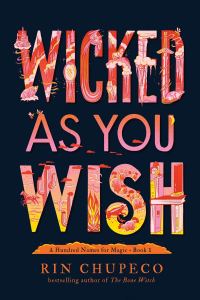
Wicked as You Wish by Rin Chupeco
It’s a rare thing when I encounter a novel that feels as though it’s written exactly for me. The first time this happened to me was when I (belatedly) read American Gods. Wicked as You Wish is the second book I’ve ever picked up where I immediately felt as though I were the target audience, and the story was just for me.
The story opens with the budding friendship between Tala Makiling Warnock, a girl who can nullify magic, and Alexei Tsarevich, heir to the throne of Avalon, in hiding after a terrible spell froze his kingdom. The Makilings are allies and protectors of the throne of Avalon, and Tala’s family is dedicated to keeping Alex safe—at least until his sixteenth birthday, when the Firebird will arrive and help him come into his powers. But the Snow Queen of Beira, Avalon’s enemy, is eager to finish the war she started, and Alex is keeping secrets of his own.
Rin Chupeco’s world draws on mythological and literary traditions including Wonderland, Oz, and Tala’s Filipino magical heritage, blending them into world building that’s contemporary and relevant (there’s a scene with ICE—at the behest of the Snow Queen facing off against Tala’s immigrant family). And while the book is marketed as YA and would certainly appeal to that audience with it’s predominantly teenaged cast, Chupeco’s sophisticated third-person omniscient narration gives readers insight into the motivations of the adults, who come through as strong leading characters as well. It’s an incredibly smart fantasy novel, and if it requires a little work to keep up with the worldbuilding and twists the story takes, it is absolutely worth the effort. The next book in the series cannot come out soon enough.
– Alana Joli Abbott
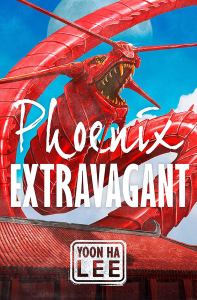
Phoenix Extravagant by Yoon Ha Lee
Yoon Ha Lee is better known for writing stories in space than fantasy, but based on his blending of space and mythology in his middle grade novel, The Dragon Pearl, I’d been looking to his first fantasy novel. I was not disappointed. Phoenix Extravagant follows Jebi, a non-binary painter trying to succeed in an occupied nation; when trying to assimilate gets them thrown out of their house by their sister, and fails to get them a well-paying job they’d applied for, Jebi’s at a loss. Jebi has no desire to work at the Ministry of Armor, aiding the war effort that continues to oppress their people by painting the magical commands for automata. But the Minister leaves Jebi no choice: join, or their sister—who, unknown to Jebi, is a revolutionary—will pay the price.
Jebi’s gift for painting allows them to communicate with a dragon automata, who was painted with pacifist instructions, and the two make plans to escape the conflict all together. Lee’s story tackles themes comparable to Peter Tieryas’s “United States of Japan” trilogy and Arkady Martine’s A Memory Called Empire, especially in the way both of those series look at ideas of assimilation and the justice—or injustice—of dues one pays to their government. Lee gives no clear moral answers in the tale—Jebi’s sister seems to prioritize revolution over family, Jebi’s lover has killed people Jebi cares about, and the antagonist may have valid reasons for his evil plots—and that’s part of what makes the story so compelling to navigate. The novel is planned as a standalone, but I’d love to read more set in this world.
– Alana Joli Abbott
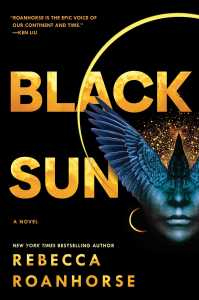
Black Sun by Rebecca Roanhorse
Reading Black Sun was like opening a new door in my mind. This is an epic fantasy series opener, and a lot of the tropes are familiar, but they’re all presented with different structure and framework–enough so that the novel feels like something entirely new. The story centers on Serapio’s journey to the homeland of his mother, where a bloody destiny awaits him; the efforts of Sun Priestess Naranpa to revolutionize her priesthood and make them more relevant as true servants uplifting the people of her city; and Xiala a ship captain whose supernatural origins make her both feared and targeted, but whose earthy attitude grounds the story. While Naranpa and Serapio are set up by the cosmology to be enemies, Roanhorse depicts them both so sympathetically that readers will hope for both of them to survive–and thrive–despite whatever fate has in store for them.
Roanhorse draws on indigenous American and Polynesian cultural and physical geography, which makes the world feel rich and new in a genre that has traditionally drawn on classical or feudal Europe for its influences. Using language that tends toward poetic, she plays with time, so that the narrative moves backward and forward around the events rather than in a linear fashion, which means the reveals of the narrative come not as the story progresses, but as readers progress through the story. Don’t be surprised to see this one on all the award lists in 2021.
– Alana Joli Abbott
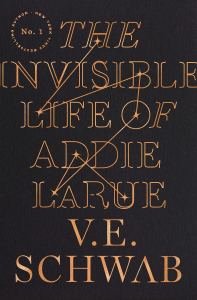
Invisible Life of Addie LaRue by V.E. Schwab
A girl makes a deal with the devil to live forever, and is cursed to be forgotten by everyone she meets. It’s the kind of premise a book could coast on, but V.E. Schwab has never been a coaster. From the very beginning of her career, the 33-year-old fantasy author has elevated engaging plot with unforgettable prose, resulting in stories that stick with their readers long after the book has been closed.
With The Invisible Life of Addie LaRue, the story is a particularly ambitious one: spanning 300 years, from 18th century France to modern New York City, we follow Addie as she learns how to live an existence in which she cannot hold a job, cannot rent an apartment, cannot have relationships. “We tell these immortality tales of men where all of a sudden they’re immortal and it’s just like, go get rich, go have fun, go have 100 mistresses and just sleep your way through eternity,” Schwab told Den of Geek earlier this year. “But women would never have that option.”
But this is not just Addie’s story. It also belongs to Henry, the only person Addie meets in three centuries who can remember her. Henry is a millennial living in New York, living with mental illness. In a story whose only other two main characters are an immortal woman and a devil, Henry is our human.
Ultimately, like so many of Schwab’s books, The Invisible Life of Addie LaRue is not quite what you expected: romantic and Romantic, modern yet classic, Addie was one of the unforgettable books of 2020.
Best Young Adult Books of 2020
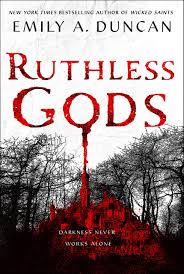
Ruthless Gods by Emily Duncan
Emily Duncan’s “Something Dark and Holy” trilogy is everything YA fiction is not supposed to be: Dark, frightening, unsettling, and very, very bloody. Its second installment, Ruthless Gods, is a complex tale of war, betrayal, and heartbreak – a story that is not particularly hopeful, gory in a way this genre is rarely allowed to be, and populated by heroes who are often anything but.
The novel follows three lead characters: Nadya, a young mystic who talks to gods but can no longer hear them; Serefin, a king whose country has long been at war with Nadya’s and whose life and consciousness are no longer entirely his own; and Malachiasz, a deeply disturbed boy who either wants to destroy the gods, become one himself, or something in between. Over the course of the story, their lives become intertwined on what feels like a cosmic level, as politics, religion and the very survival of humanity collide.
Duncan’s prose is rich and lush, full of gorgeous descriptions of eldritch nightmares and frightening visions, with a fair amount of body horror thrown on top. For YA fans, this is a series that is unlike most anything else you’ve encountered this year.
– Lacy Baugher
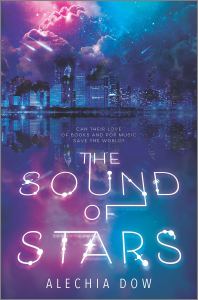
The Sound of Stars by Alechia Dow
There aren’t a lot of books I read this year that captured the feel of 2020 as well as The Sound of Stars. There’s no pandemic in this book, but the alien invasion that results in humans being locked inside their apartment buildings, unable to socialize, their normal lives taken from them because the world outside just isn’t the same? I’m sure Dow never intended that to be a metaphor, but it worked for me!
The title takes its name from a fictional album performed by fictional band The Starry Eyed, whose media presence before the alien invasion provides a framework for the book. The story centers on Ellie, a black girl determined to help her human community escape through the illegal borrowing of books, and M0Rr1S (Morris), an Ilori labmade, responsible for vaccinating humanity to prepare Earth for Ilora habitation. Morris, unlike other Ilori, is emotional, and loves music; immediately Ellie intrigues him with her bravery and willingness to risk everything for the sake of stories. When he enlists her to steal hidden music for him, their uneasy friendship begins, and as the stakes get higher, Ellie and Morris travel across the country on a mission to save humanity.
The story is fantastical and earnest and hopeful, and it was especially wonderful to experience in the audio production, which featured two excellent voice actors telling the story of stories and music and love.
– Alana Joli Abbott
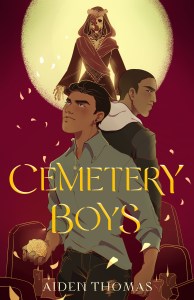
Cemetery Boys by Aiden Thomas
“I know the exact moment of inspiration for [Cemtery Boys],” Aiden Thomas told Den of Geek about his YA debut. “[A Tumblr writing prompt asked], ‘What would you do if you summoned a ghost and you couldn’t get rid of it?’ And you see people commenting and stuff and they’re like, ‘Oh, this super spooky, scary thing.’ And I was like, ‘Okay, but what if he was cute?’”
Cemetery Boys is not only breaking new ground when it comes to explorations of trans identity and Latinx culture, it’s also a delightful read. The story of Yadriel, a trans teen boy determined to prove himself a brujo to his traditional Latinx family, Cemetery Boys has the best inciting incident: Trying to get answers about his cousin’s mysterious death, Yadriel attempts to summon the ghost of his cousin. Instead, he summons the (cute) ghost of school “bad boy” Julian. Julian has some questions of his own he’s looking to answer and, when he refuses to leave, Yadriel’s mission gets a little more complicated… especially once Yadriel realizes he might not want Julian to go.
Romantic and hilarious, sweet and suspenseful, Cemetery Boys has so much to fall in love with: from its diverse cast of characters to its vibrant and complex world. Thomas wrote the novel, in part, so that young, marginalized readers would have a story not only to escape into but also “where they see themselves as being incredibly powerful, supported, but very importantly, being loved.” Cemetery Boys is a gift to us all, and a reminder of what is possible when the still far-too-inaccessible publishing industry lets more people in.
“No, it wasn’t the end. It was a better beginning.”
Best Non-Genre Books of 2020

The Darling Killers by Sarah McCarry
Over the summer, mere weeks into lockdown and in the phase of the pandemic where it felt like you couldn’t trust anyone or anything outside of your precarious bubble, author Sarah McCarry began serializing her latest novel The Darling Killers via a weekly Substack newsletter. The sparklingly clever title tells you plenty, but in short, it’s a female-perspective Talented Mr. Ripley by way of Los Angeles’ glittery world of young adult authors whose mastery over words has earned them obsessive fandoms and access to the endless party life.
In the style of the best thrillers, this lush novel provided the perfect escapism as antiheroine Sofia Bencivenga arrives in LA and immediately falls in with a trio of talented, haunted writers: ethereal Alison, bitchy Judith, and charismatic Jaxson. Sofia goes from shadowing their weekly writing dates to conning her way into emerging-writer status, but when Alison dies under suspicious circumstances at one of Jaxson’s fabulous parties, Sofia has to pause in her pursuit of vicariously living through Alison’s life to consider its dangerous flipside.
It would have been enough for the book to skewer the particular cult of YA author celebrity, to mock how every supporting character nurses their own dreams of writing—or at least acting out—The Great American Novel. But McCarry also gets to the heart of yearning to create worlds and characters, the ache of writing-as-processing, the thrill of trying on other stories and lives—she grabs that heart out of your chest and shows it back to you, thumping obscenely but recognizably. Back when the rest of 2020 stretched out ahead of us, especially uncertain, waking up to each installment every Tuesday morning was one of the few things keeping me looking forward to the next week.
– Natalie Zutter
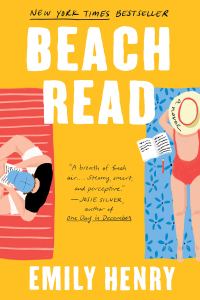
Beach Read by Emily Henry
Beach Read is perhaps the worst misnomer of any book title on this list, and the cover doesn’t help. The lead characters only go to the beach near their adjoining properties once, maybe twice! Emily Henry’s gem lies somewhere between romance and literary fiction, mirroring her characters’ work. In Beach Read, next door neighbors find themselves uncomfortably close – they can see in one another’s windows, when they’re both on the deck they can easily chat at normal volume – and of course their first interaction is fraught.
It doesn’t take long to find out they’re both writers – she, romance; he, literary fiction – and amid an argument about whose work is easier, a challenge to swap genres unfolds. Throughout the heat of the summer they teach one another about their respective genres and open up about their lives. It’s darker than the average romance – he’s writing about a cult where pretty much everyone died; she’s cleaning out her dead father’s home – but if you’re looking for something with adult sex/romance and adult relationships and emotional pitfalls in equal measure, Beach Read has you covered.
– Delia Harrington
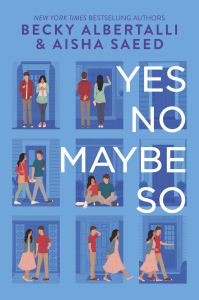
Yes, No, Maybe So by Becky Albertalli and Aisha Saeed
In a year when politics was inescapable and inescapably miserable, Yes, No, Maybe So provided political escapism that soothed my soul in the form of a romcom about a state senate race. While the setup might sound contrived – two teens, a Jewish boy and a Muslim girl volunteer to knock on doors together and fall in love – the book itself featured well-drawn characters. Trading off narration by character and corresponding author, we learn about their home lives, friends, hopes and fears, why they’re invested in this race, and how they really feel about one another.
Taking place mostly during Ramadan, the book has some fun easter eggs for veteran canvassers and field staff while doing a decent job explaining some of the inner workings of a state-level campaign for newcomers. Anyone interested in getting more politically active will find numerous examples in the book of how to do so, and it certainly helps that as Jamie and Maya face their respective fears, they make getting involved seem easier to the reader, too. The book is incredibly earnest, tender and sweet, both about politics and their romance, especially under Jamie’s narration, but Maya and their circumstances bring in a dose of realism to help balance things out so it’s not too saccharine.
– Delia Harrington
What were your favorite books of the year? Let us know in the comments below.
